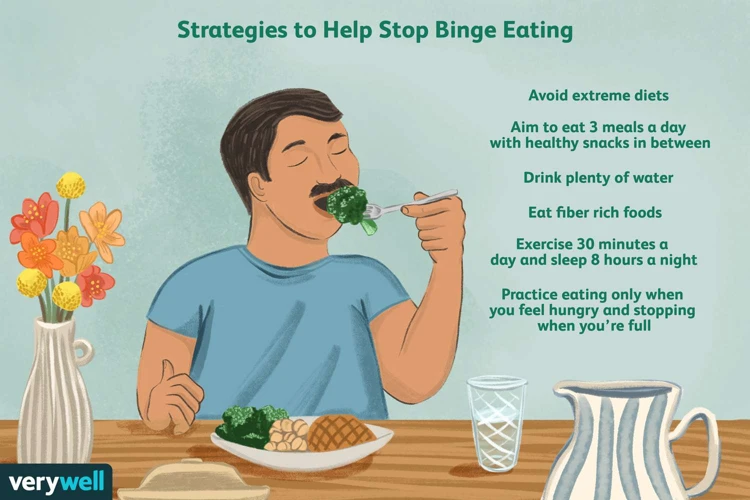Picture this: you’re lying in bed, scrolling through social media, and suddenly you hear your stomach grumbling. Before you know it, you’re raiding the kitchen for a late-night snack. Sound familiar? Many of us struggle with nighttime eating, which can be a difficult habit to break. But why does it happen, and how can we overcome it? In this article, we’ll explore the impact of nighttime eating on our health and weight, identify common triggers, and provide strategies for conquering those cravings once and for all. So if you’re tired of feeling guilty about your midnight snacking, read on for some expert advice.
Why Nighttime Eating is a Problem

When the sun goes down, many of us find ourselves drawn to the fridge or pantry, seeking out snacks and comfort foods to help us relax and unwind. While this may seem like a harmless habit, nighttime eating can actually have serious consequences for our health and weight management goals. From disrupting our sleep to causing weight gain and other health problems, it’s important to understand the risks and consequences of nighttime eating in order to make healthier choices for our bodies and minds. In this section, we’ll explore the reasons why nighttime eating can be such a problem, and what you can do to overcome it.
Impact on Health
Nighttime eating has a significant impact on a person’s health, particularly when it leads to overeating or consuming foods that are high in calories, sugar, or fat. Some of the health consequences of this habit include:
| Increased risk of obesity: | Studies have found that people who consume more calories during the night are more likely to be overweight or obese. This is because the body’s metabolism slows down at night, making it harder to burn off excess calories. |
| Poor sleep quality: | Nighttime eating can disrupt the body’s natural sleep-wake cycle and negatively affect the quality of sleep. This is because the body is focused on digestion, rather than rest and repair. |
| Increase in blood sugar: | Eating high-sugar foods before bed can cause a spike in blood sugar levels, which can contribute to insulin resistance and an increased risk of type 2 diabetes. |
| Digestive problems: | Eating large meals or snacks before bed can cause digestive discomfort, including acid reflux, indigestion, and bloating. This can make it harder to fall asleep and stay asleep. |
| Increased risk of heart disease: | Data suggests that consuming a large amount of calories late in the day may increase the risk of developing heart disease, regardless of body weight. |
Making an effort to reduce nighttime eating is an important step in maintaining good health and preventing chronic illness. By identifying the triggers that lead to excessive snacking at night and implementing strategies to overcome them, individuals can improve their wellbeing and achieve a better quality of life.
Role in Weight Gain
Studies have shown that indulging in nighttime eating can be a major contributor to weight gain. This can be attributed to several factors:
- Caloric Intake: Eating at night can lead to consuming more calories than the body needs, as people may eat out of boredom or emotional distress rather than hunger.
- Poor Food Choices: Late-night cravings are often for unhealthy snacks high in sugar, sodium, and fat, which can add up quickly in terms of caloric intake.
- Disrupted Sleep Patterns: Eating too close to bedtime can interfere with the body’s natural sleep-wake cycle, leading to poor sleep quality. This can contribute to weight gain as lack of sleep has been linked to a higher risk of obesity.
- Impaired Insulin Response: Consuming carbohydrates late at night can impair the body’s insulin response, as the body’s metabolism slows down at night. This can lead to weight gain as the body is less able to metabolize and store energy properly.
Nighttime eating can be a significant factor in weight gain and should be addressed when trying to maintain or lose weight. It’s important to be mindful of not only what we eat but when we eat it, and to establish healthy eating habits that support a good night’s sleep and optimal health.
Identifying Triggers for Nighttime Eating

Understanding the reasons behind nighttime eating can be a challenging task. However, it is crucial to identify the triggers that lead to this unhealthy behavior in order to create effective strategies for overcoming it. By exploring the emotional, environmental, and physiological factors that contribute to nighttime eating, we can gain valuable insights into our own habits and develop a plan for better self-care. Let’s dive deeper into the world of nighttime eating and discover how to recognize its triggers.
Emotional Eating
Emotional eating is a common trigger for consuming food late at night, often resulting in overeating and weight gain. This type of eating is driven by emotions rather than hunger, and can lead to a vicious cycle of guilt and further emotional eating. To combat this behavior, it is important to identify and address the root emotions that trigger it.
Here are some strategies to recognize and overcome emotional eating triggers:
- Keep a food diary: Documenting the types of food, time of day, and your emotional state can help identify patterns and triggers for nighttime eating. This can be a helpful tool for creating a plan to avoid these triggers.
- Find alternative coping mechanisms: Rather than turning to food when experiencing negative emotions, try to find other ways to cope such as exercising, journaling, or talking to a friend. It may take some time to find what works best, but it is worth the effort to develop a healthier coping mechanism.
- Avoid restrictive diets: Restrictive diets can lead to feelings of deprivation and trigger emotional eating. Instead, focus on a balanced and nutritious diet to reduce the likelihood of extreme hunger and emotional eating.
- Practice self-compassion: Be kind to yourself and offer self-compassion when experiencing negative emotions. This can help reduce the need to numb emotions with food and prevent further emotional eating.
By identifying and addressing emotional eating triggers, individuals can develop a healthier relationship with food and reduce the likelihood of nighttime overeating.
Environmental Triggers
Environmental triggers refer to external factors that can lead to nighttime eating behaviors. These triggers can be very subtle and hard to identify, but by paying closer attention to your environment, you may be able to pinpoint some of the factors that cause you to eat at night. Here are some of the most common environmental triggers for nighttime eating:
- Unhealthy food in the house: When unhealthy snacks and junk food are readily available, it’s easy to give into temptation and indulge in calorie-dense foods late at night. Consider removing these types of foods from your home and replacing them with healthier options.
- Watching TV or movies: Many people tend to snack while watching TV or movies in the evening. This mindless snacking can quickly add up in terms of calories consumed. If you find yourself snacking frequently while watching TV, consider switching to a different activity such as reading or taking a walk.
- Exposure to food-related stimuli: Seeing or smelling food can be a powerful trigger for hunger and can make you crave a late-night snack. If possible, avoid being around food in the evenings or try to distract yourself with other activities.
- Irregular eating patterns: Eating irregularly can lead to increased hunger in the evenings. When you skip meals or don’t eat enough during the day, your body may try to compensate by urging you to eat late at night. Try to establish a regular eating schedule to avoid spikes in nighttime hunger.
By identifying environmental triggers for nighttime eating and taking steps to avoid or mitigate them, you can significantly reduce your nighttime eating behaviors and achieve your weight loss and health goals.
Physiological Triggers
Physiological triggers refer to the physical cues that can drive nighttime eating. These can include various factors, such as hormonal imbalances, blood sugar fluctuations, or dehydration. It’s important to recognize these triggers to better understand and address them. Here are some examples of physiological triggers that can cause nighttime eating:
| Trigger | Description |
|---|---|
| Hormonal imbalances | Changes in hormones like cortisol, insulin, and ghrelin can cause cravings and hunger at night. |
| Blood sugar fluctuations | Low blood sugar levels can trigger hunger and cravings, which may lead to nighttime eating. |
| Dehydration | Dehydration can sometimes cause feelings of hunger, leading to late-night snacking. |
| Medications | Certain medications, such as antidepressants or steroids, can affect appetite and trigger cravings. |
If you suspect that your nighttime eating is caused by physiological triggers, it’s important to talk to your healthcare provider to rule out any underlying medical conditions and receive proper treatment. Additionally, incorporating healthy habits like drinking enough water, maintaining stable blood sugar levels with a balanced diet, and staying physically active can help alleviate some of these triggers.
Strategies to Overcome Nighttime Eating Triggers

If you’re someone who struggles with nighttime eating, there are strategies you can use to overcome the triggers that lead to consuming excess calories before bedtime. By identifying and addressing the root causes of your nighttime eating habits, you can develop healthy alternatives and mindful eating techniques to break the cycle. In this section, we’ll explore various tactics you can use to curb those pesky cravings and establish healthier habits.
Healthy Alternatives to Junk Food
When it comes to nighttime eating, one of the main culprits is usually junk food. It’s easy to reach for a bag of chips or a pint of ice cream while lounging on the couch, but the high sugar and fat content can lead to weight gain and decrease in overall health. However, it’s possible to still enjoy tasty snacks without sacrificing health.
Here are few healthy alternatives to junk food that can be incorporated into your nighttime routine:
| Junk Food | Healthy Alternative |
|---|---|
| Chips | Popcorn seasoned with herbs or spices instead of butter or salt |
| Candy Bars | Fruits like strawberries, watermelon, or frozen grapes |
| Ice Cream | Greek yogurt topped with berries and honey |
| Cookies | Oatmeal banana cookies or protein bars |
| Soda | Sparkling water infused with fruit like lemon or cucumber |
It’s important to keep your kitchen stocked with these healthy alternatives so that they are within reach when the craving strikes. Incorporating more whole, unprocessed foods can not only satisfy hunger, but also provide essential nutrients that can improve overall health.
Remember, these alternatives should be consumed in moderation, as snacking excessively can lead to overconsumption of calories regardless of the health aspect of the snacks chosen.
Mindful Eating Techniques
One effective strategy for overcoming triggers for nighttime eating is to practice mindful eating techniques. This involves slowing down and being fully present while eating, rather than mindlessly consuming food. Here are some mindful eating techniques to try:
| Technique | Description |
|---|---|
| Awareness check-ins | Before diving into a late-night snack, take a few moments to check in with yourself. Ask yourself whether you’re actually hungry or if you’re eating out of boredom, stress, or habit. |
| Savoring | Instead of scarfing down your food, take the time to savor each bite. Notice the flavors, textures, and smells of the food. |
| Chewing slowly | People often rush through their meals, which can lead to overeating. Chewing slowly and thoroughly can help you feel satiated with less food. |
| Putting down utensils between bites | To help slow down your eating, try putting down your utensils between each bite. This can help you become more aware of your feelings of fullness. |
| List of triggers | Make a list of your triggers for nighttime eating, as described in the previous section. Before reaching for food, check the list and see if you can identify which trigger is prompting you to eat. |
By incorporating these mindful eating techniques, you may find that you eat less overall and are more in tune with your body’s hunger and satiety signals. This can help you avoid mindless late-night snacking and improve your overall health and wellbeing.
Managing Stress and Emotions
Stress and emotions can be significant triggers for nighttime eating. Many people turn to food as a way to cope with stress or negative emotions, leading to a cycle of emotional eating that can be difficult to break.
To manage stress and emotions, try incorporating the following strategies into your daily routine:
| Exercise | Physical activity can help reduce stress and improve mood. Aim for at least 30 minutes of exercise per day, such as yoga, walking, or jogging. |
| Meditation or Deep Breathing | Practicing mindfulness techniques, such as meditation and deep breathing, can help calm the mind and reduce stress levels. Consider using a meditation app or guided audio to help get started. |
| Journaling | Writing down your thoughts and feelings can help you process emotions and reduce stress. Try making a habit of journaling before bed to help clear your mind and promote relaxation. |
| Talking to a Friend or Therapist | Speaking with a trusted friend or mental health professional can provide support and guidance in managing stress and emotions. Don’t hesitate to reach out for help when needed. |
With consistent practice, these strategies can help you better manage stress and negative emotions, reducing the likelihood of turning to food for comfort at night.
Creating a Nighttime Routine
As we’ve discussed earlier, nighttime eating can have severe consequences on our overall health and well-being. But did you know that creating a nighttime routine can help you overcome these triggers and make healthier choices? Setting up a nighttime routine can be a great way to establish healthy habits and promote better sleep hygiene. In this section, we’ll dive into some strategies that can help you establish a consistent nighttime routine and overcome triggers for nighttime eating. Let’s explore the power of routine and self-care!
Establishing a Consistent Sleep Schedule
One of the most effective strategies for overcoming triggers for nighttime eating is to establish a consistent sleep schedule. This involves setting a regular bedtime and wake-up time and sticking to it, even on the weekends.
Why is a consistent sleep schedule important?
Having a consistent sleep schedule helps regulate your body’s internal clock, known as the circadian rhythm. This can improve the quality of your sleep, making it easier to fall asleep and stay asleep throughout the night. When your circadian rhythm is disrupted, it can lead to sleep deprivation, which can trigger cravings for unhealthy foods and increase your risk of weight gain.
How can you establish a consistent sleep schedule?
Here are some tips for establishing a consistent sleep schedule:
| Tips for Establishing a Consistent Sleep Schedule |
|---|
| Avoid napping during the day |
| Avoid caffeine, nicotine, and alcohol close to bedtime |
| Keep your bedroom cool and dark |
| Avoid screens at least 30 minutes before bedtime |
| Establish a bedtime routine, such as taking a warm bath or reading a book |
| Aim to get 7-9 hours of sleep each night |
By following these tips, you can establish a consistent sleep schedule and improve the quality of your sleep. This can ultimately help you overcome triggers for nighttime eating and achieve your health and wellness goals.
Avoiding Screen Time
In order to create a nighttime routine that helps you overcome triggers for nighttime eating, it’s essential to avoid screen time in the hours leading up to bedtime. This is because exposure to screens can interfere with the body’s ability to produce melatonin, the hormone that regulates sleep.
Here are some tips on how to avoid screen time:
- Set a time limit for technology use in the evening.
- Leave electronic devices outside of the bedroom.
- Replace screen time with more calming activities, such as reading or meditation.
- Use blue light blocking glasses or screens to reduce the impact of electronic devices on sleep quality.
By reducing your exposure to screens, you can improve your body’s natural sleep cycle and reduce the likelihood of nighttime eating triggers. So, next time you’re tempted to scroll through social media late at night, consider putting the devices away and opting for a more relaxing and sleep-conducive activity instead.
Relaxing Activities
One effective strategy for overcoming nighttime eating triggers is incorporating relaxing activities into your bedtime routine. Doing calming activities can help reduce stress and promote relaxation, which in turn may help prevent the urge to snack late at night. Here are some ideas for relaxing activities to try:
| Activity | Description |
|---|---|
| Yoga or Stretching | Joining a beginner’s yoga or stretching class helps you stretch out your muscles and relax your body while improving your flexibility and range of motion. Practicing yoga has been found to promote better sleep and help reduce stress and anxiety. |
| Meditation | Meditation is a technique that can help your brain relax and reduce racing or anxious thoughts. It involves focusing on your breath and allowing your mind to relax, and can help to promote feelings of calm and well-being. |
| Reading | Studies show that reading can help us relax and unwind. Reading a book, a magazine, or your favorite blog can provide a healthy distraction, helping you to fall asleep easier and stay asleep longer. |
| Bath or Hot Shower | Soaking in a warm bath or taking a hot shower can help relax your muscles and ease tension. It’s also another way to relax and enjoy some quiet time. |
By incorporating some of these activities into your evening routine, you can help yourself relax and unwind before bed, making it less likely that you’ll feel the urge to snack late at night. Ultimately, relaxing before bedtime can help you sleep better, feel better, and avoid unhealthy eating habits.
Conclusion
In conclusion, nighttime eating can be a difficult habit to break, but it is not impossible. By identifying and addressing the triggers that lead to this behavior, individuals can take control of their eating habits and improve their overall health and wellbeing. It is important to recognize that nighttime eating is often linked to emotional and environmental factors, and that addressing these factors may require some effort and self-reflection.
Fortunately, there are several strategies available to help individuals overcome nighttime eating triggers. Practicing mindful eating techniques, looking for healthy alternatives to junk food, and managing stress and emotions can all be effective tools for conquering nighttime eating habits. Additionally, establishing a consistent sleep schedule, avoiding screen time, and engaging in relaxing activities before bed can help to create a peaceful and calming nighttime routine.
Ultimately, breaking the nighttime eating habit requires a long-term commitment to positive lifestyle changes. By incorporating these strategies into their daily life, individuals can take control of their health and achieve a better quality of life. With persistence, patience, and a willingness to change, anyone can overcome the triggers for nighttime eating and live a healthier and happier life.
Frequently Asked Questions
Can eating late at night affect my health?
Yes, eating late at night can negatively impact your health. It can affect your digestion, disrupt your sleep, and increase your risk for health conditions such as obesity and type 2 diabetes.
What are some environmental triggers for nighttime eating?
Environmental triggers for nighttime eating can include the presence of junk food in the house, watching TV, and being in the kitchen or dining room.
How can emotional eating trigger nighttime eating?
Emotional eating can trigger nighttime eating because feelings of stress, anxiety, or loneliness can lead to cravings for comfort foods to help cope with emotions.
What are some strategies to overcome nighttime eating triggers?
Some strategies to overcome nighttime eating triggers include developing healthy alternatives to junk food, practicing mindful eating techniques, and managing stress and emotions.
Can mindfulness help with nighttime eating?
Yes, practicing mindfulness can help with nighttime eating by increasing awareness of hunger and fullness cues, reducing stress, and promoting overall healthy eating habits.
How can a consistent sleep schedule help with nighttime eating?
A consistent sleep schedule can help with nighttime eating by regulating hormones that control appetite and promoting better sleep, which can reduce the incidence of nighttime cravings.
What are some relaxing activities to include in a nighttime routine?
Some relaxing activities to include in a nighttime routine can include reading a book, taking a warm bath or shower, meditating, or practicing gentle yoga.
Can managing stress help with nighttime eating?
Yes, managing stress can help with nighttime eating because stress can trigger emotional eating and disrupt sleep, both of which can lead to increased nighttime cravings.
What should I do if I still have nighttime cravings after trying these strategies?
If you still have nighttime cravings after trying these strategies, it may be helpful to speak with a healthcare professional or registered dietitian to develop a personalized plan that addresses your specific needs and goals.
Is it ever okay to eat at night?
It is generally recommended to avoid eating late at night or close to bedtime, but if you are truly hungry, it is better to have a small, healthy snack rather than going to bed hungry or binging on unhealthy foods.







